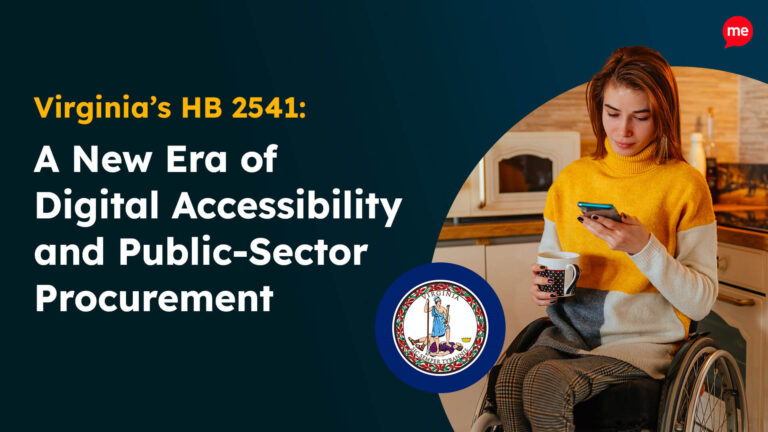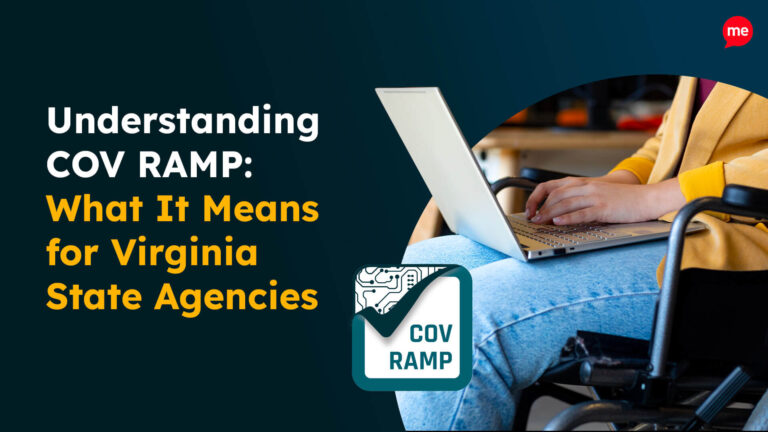Get A Free ADA Compliance Audit Of Your Website
Download NowIn recent years, there has been a notable surge in the number of states choosing to enact stand-alone legislation and policies to address digital accessibility. Massachusetts is one of them.
By supplementing existing federal laws with state-specific measures and initiatives, local government authorities hope to level the playing field for the 787,330 Massachusettsans living with disabilities.
What does that mean for businesses operating in The Bay State? Here’s everything you need to know.
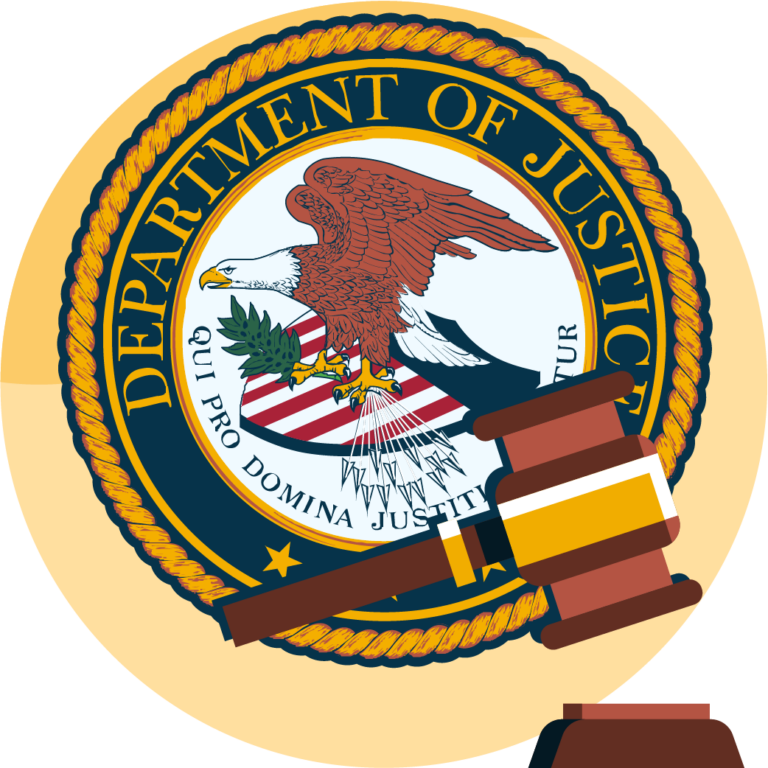
Web Accessibility Laws in Massachusetts
As in every other state, federal digital accessibility laws apply to both public and private enterprises. However, in a bid to enhance the rights of individuals with disabilities, Massachusetts has its own stand-alone IT accessibility policy. Plus, a new governmental position and Digital Accessibility and Equity Governance Board was created in 2023 to drive positive change further.
Massachusetts Enterprise Information Technology Accessibility Policy
Based on Executive Order No. 348 and overseen by the Executive Office of Technology Services and Security (EOTSS), this policy ensures that state-operated information technology (IT) solutions are usable by commonwealth employees and members of the general public with disabilities, as required by federal law.
Under the Enterprise Information Technology Accessibility Policy, government agencies are responsible for ensuring that all IT solutions and online content fully comply with established accessibility standards. Much like stand-alone web accessibility legislation in other states, the policy applies to all electronic and information technology (EIT), regardless of whether it has been developed in-house or acquired from a third party. That means that in addition to government agencies themselves, the policy applies equally to:
- Government contractors and subcontractors – Like construction companies and third-party software developers.
- Government vendors – Like office equipment and catering suppliers.
- Government consultants – Like IT, legal, and project management firms.
The benchmarks for compliance are based on established Web Content Accessibility Guidelines (WCAG). However, the level of compliance depends on the nature of the EIT in question:
- Web and desktop applications, multimedia content, and electronic documents must comply with WCAG 2.1 Levels A and AA.
- Web and desktop applications used to produce content must comply with WCAG 2.0 Levels A and AA.
The Digital Accessibility and Equity Governance Board
In July 2023 (on the 33rd anniversary of the Americans with Disabilities Act, to be precise), the State created a Chief IT Accessibility Officer role to help further improve the accessibility of state services for individuals with disabilities. Alongside the new position, The Digital Accessibility and Equity Governance Board was established under Executive Order No. 614.
The board is chaired by cabinet leaders, disability experts, and residents with lived experience, and each executive office has an appointed accessibility officer to ensure the planning, development, and implementation of digital accessibility strategies remain consistent.

The Americans With Disabilities Act
The Americans with Disabilities Act (ADA) is a landmark piece of equality legislation. Enacted in 1990, it initially addressed only physical accessibility barriers encountered by individuals with disabilities. However, its evolution over time has expanded to encompass digital spaces, recognizing websites and online platforms as integral extensions of physical environments.
The five titles of the ADA’s lay out guidance for how government agencies and public-facing organizations should ensure compliance. However, only three of the five titles relate specifically to fostering a more inclusive society by enhancing digital accessibility:
- ADA Title I mandates accessibility in federal employment practices.
- ADA Title II focuses on the accessibility of public services and programs offered by state and local governments.
- ADA Title III extends to public-facing private entities, mandating full and equal online access for individuals with disabilities to goods, services, facilities, privileges, etc.
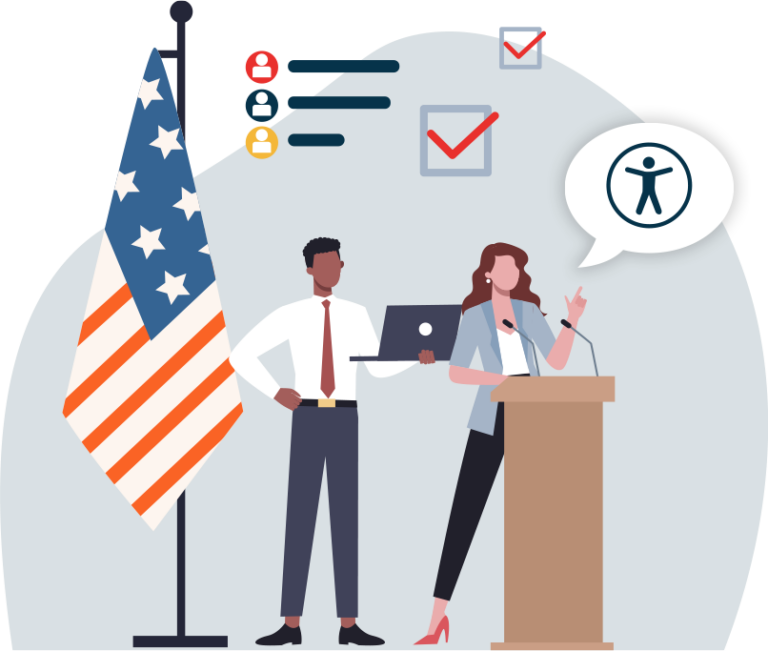
Section 508 of the Rehabilitation Act
Section 508 mandates that all electronic and information technology (EIT) used by federal agencies, including websites, software, and other digital assets, be accessible to individuals with disabilities – whether they be employees or members of the general public. The two primary goals are to ensure that:
- Federal employees have equal access to online resources – Eliminating digital barriers allows full participation and productivity, regardless of disability.
- Members of the public have equitable access to information and services. Access to public-facing information must be comparable for disabled and non-disabled citizens.
Stay ahead of the game when it comes to Digital Accessibility laws and compliance in the United States. Learn about all the different federal and state-level regulations, see real examples of web accessibility lawsuits in different regions and discover a 7-step action plan for building accessible websites.
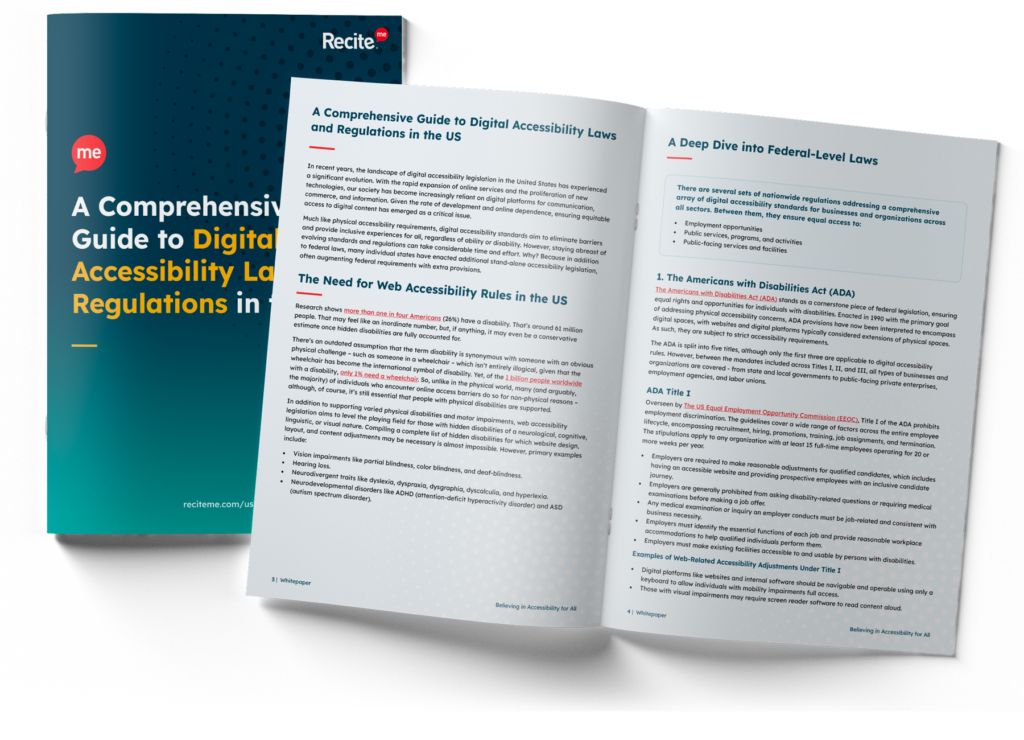
What Types of Business Are Affected By Massachusetts Web Accessibility Legislation?
ADA and Section 508 stipulations apply to all public and public-facing entities, plus any business operating within the supply chain of a federal or state agency. That means that web accessibility legislation in Massachusetts applies just as much to non-profit and private sector companies as it does to state agencies and offices. All in all, many types of organizations can be affected:
- Government agencies at the federal, state, and local levels.
- Contractors and subcontractors working on government projects.
- Vendors supplying products and services to government agencies.
- Educational institutions and charities receiving federal funding.
- Healthcare, transport, and finance organizations affiliated with federal programs.
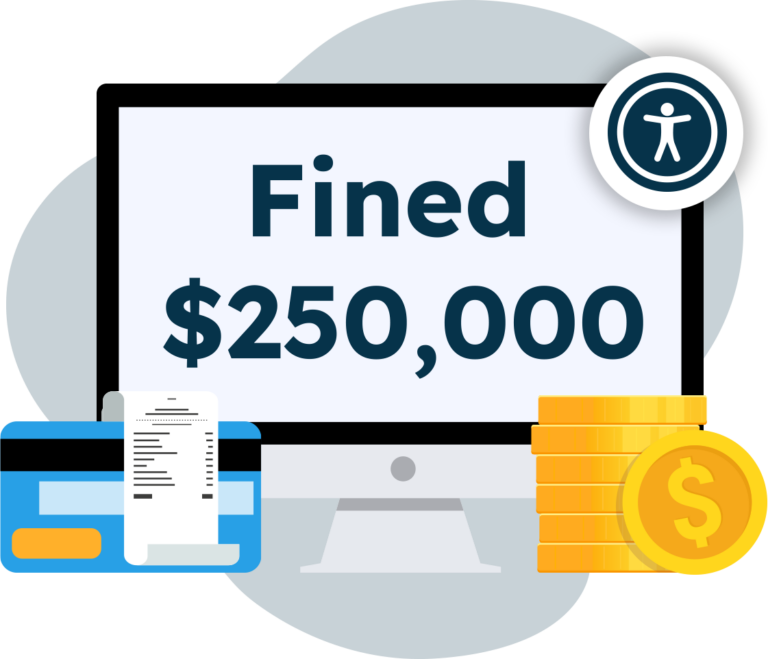
What are The Risks and Consequences of Non-Compliance?
Under state policies, businesses found to be discriminating against disabled citizens in a place of public accommodation in Massachusetts (which, as per the ADA, includes websites) may be fined $300- $2500.
Meanwhile, federal violations under the ADA and Section 508 can result in fines of up to $55,000 for a one-off breach, rising to USD 110,000 for each subsequent violation. Plus, organizations receiving public funding risk having their contracts revoked.
Of course, individual members of the public and disability advocacy groups can also sue companies citing breach of any piece of state-specific or federal web accessibility legislation as a basis, which could lead to further fines, costly lawsuits, and pricey settlement deals.
Then come the non-financial losses. Brands exposed for treating individuals with disabilities less favorably are likely to experience a drop in revenue caused by reputational damage, which can significantly limit market reach and reduce an organization’s market share.
Notable Digital Accessibility Lawsuits in Massachusetts
Within the last couple of years, Massetusates has climbed its way onto the list of top ten states for website accessibility lawsuits, highlighting the need for increased vigilance. An analysis of the primary causes for Massetusates court filings uncovered the following common criteria:
- Insufficient color contrast.
- Advertisements with inaccessible descriptions.
- Incompatibility with screen reader software.
- Missing alternative text descriptions.
- Links and buttons without descriptions.
- Lack of keyboard navigation.
Of course, many cases don’t proceed to federal court. Sometimes, plaintiffs voluntarily withdraw their claims if defendants make the necessary web accessibility upgrades. Other times, both parties agree on a closed-record out-of-court settlement. That said, here’s a short list of a few recent web accessibility cases to give you an idea of the broad scope of business sectors that may be affected:
Example 1
Plaintiff and defendant: Arnold Vargas vs Ziff Davis LLC (doing business as Tech Bargains)
Industry: Internet Software and Services
Basis of claim: The Tech Bargains website is inaccessible under ADA Title III
Example 2
Plaintiff and defendant: Stephen Giannaros vs Ziff Epic Sports, Inc.
Industry: Leisure Products
Basis of claim: The Epic Sports, Inc. website is inaccessible under ADA Title III
Example 3
Plaintiff and defendant: Meridith Jones vs Grove Collaborative, Inc.
Industry: Consumer Goods
Basis of claim: The Grove Collaborative, Inc. website is inaccessible under ADA Title III
Example 4
Plaintiff and defendant: Fredericka Nellon vs Vital Choice Seafood SPC
Industry: Food Products
Basis of claim: The Vital Choice website is inaccessible under ADA Title III
Example 5
Plaintiff and defendant: Erick Gathers vs Wet Shaving Products LLC
Industry: Beauty Products
Basis of claim: The Wet Shaving Products website is inaccessible under ADA Title III
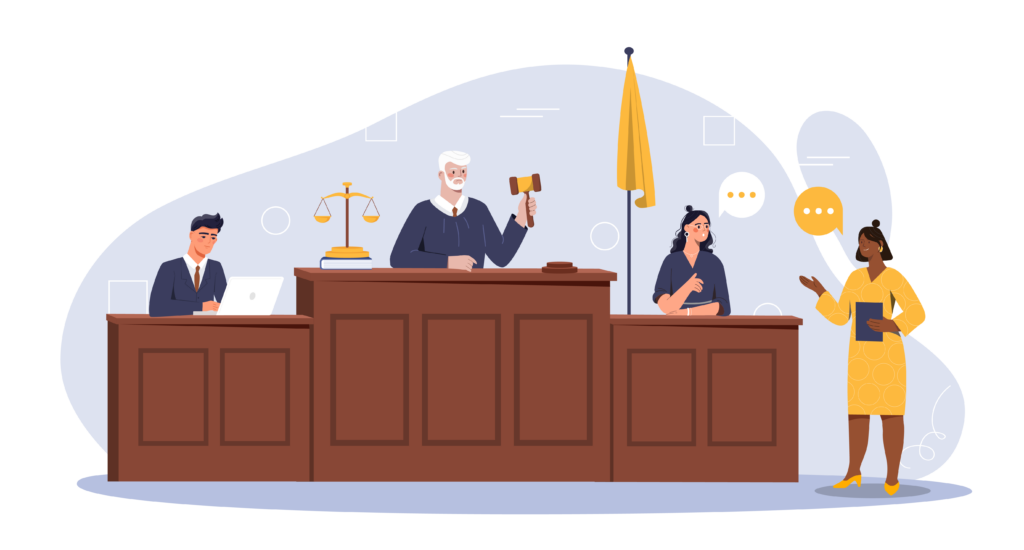
It’s essential to note that many plaintiffs file cases against multiple companies, serving as a valuable reminder that excluding just one person can have severe repercussions. For example, while the above cases were ongoing, some of the listed plaintiffs were simultaneously involved in other Massachusetts web accessibility filings:
- Fredericka Nellon – At least 2 cases
- Erick Gathers – At least 3 cases
- Arnold Vargas – At least 4 cases
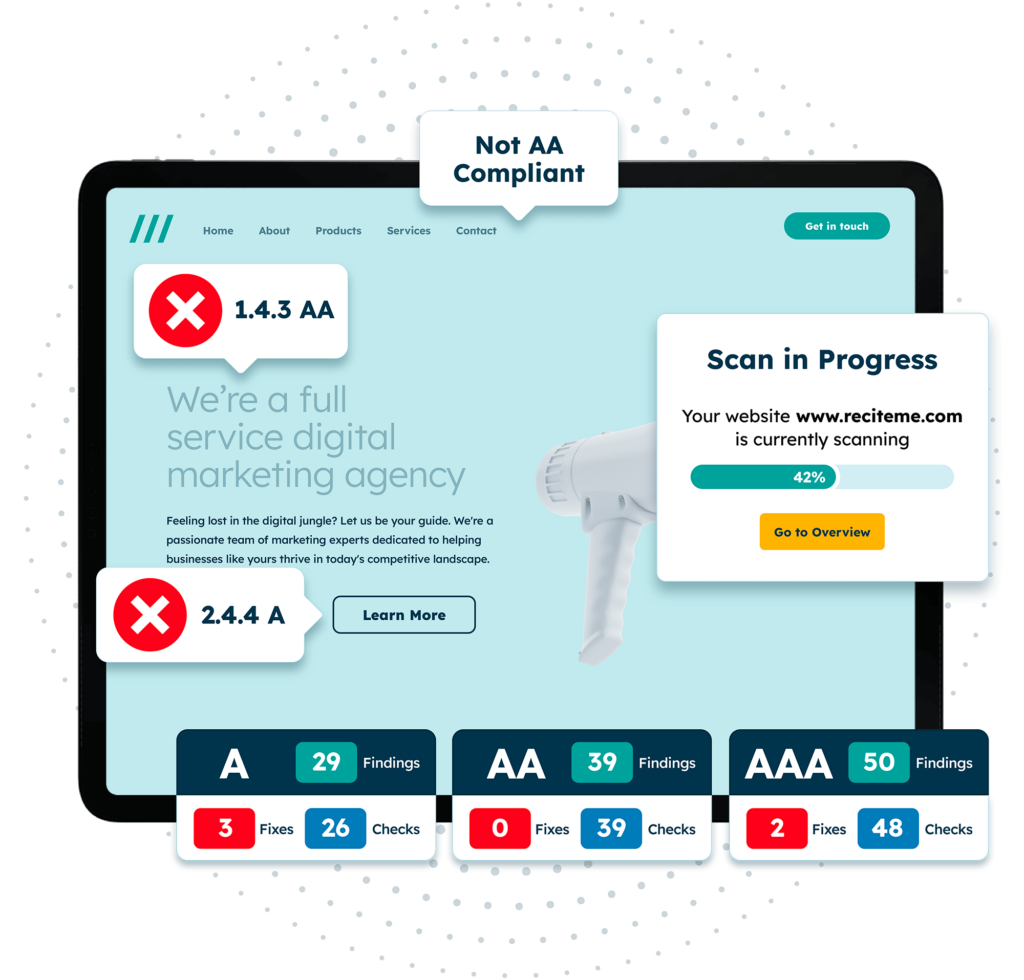
Free Accessibility Check of your Website
Finding accessibility issues is now easier than ever. Recite Me offers a free automated scan of your website’s homepage to highlight non-compliance. You’ll get recommendations on how to fix them, helping to improve your accessibility score.
The Importance of WCAG Compliance
Because both state and federal web accessibility legislation in Massachusetts is based on compliance with globally recognized WCAG standards, gaining a thorough understanding of WCAG criteria is essential.
The most up-to-date version is WCAG 2.2. However, the cornerstones of every iteration revolves around the ‘POUR’ principles, which relate to making online content adequately:
- Perceivable – Information and user interface components must be presentable to users in ways they can perceive.
- Operable – User interface components and navigation must be operable.
- Understandable – Information and the operation of the user interface must be understandable.
- Robust – Content must be robust enough to be interpreted by various user agents, including assistive technologies.
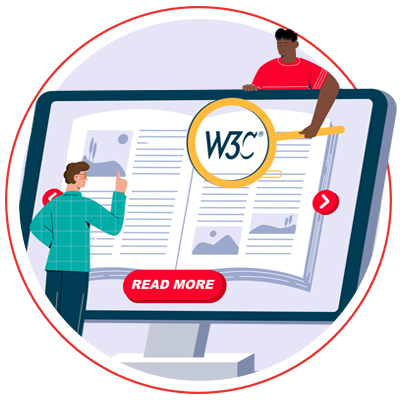
How To Make Your Website Compliant with Recite Me
Building an accessible and inclusive website can be a daunting prospect. But with the right technology and tools, there’s no reason it can’t be a straightforward process.
Recite Me offers a suite of accessibility-on-demand software to help organizations in every sector navigate compliance with confidence:
- The Recite Me Accessibility Checker runs 396 separate scans, identifies WCAG non-compliance issues, and generates a prioritized fix queue for effective resolution.
- The Recite Me Toolbar allows website visitors with varied needs and preferences to customize your website for ease of navigation and comprehension.
- Recite Me’s Free Accessibility Statement Generator automates the process of outlining current and future digital inclusion goals.
Get started on your website accessibility strategy today by working through the following action points:
- Contact our team for more advice about WCAG standards, federal laws, and Massachusetts web accessibility legislation.
- Run a free check of your website for WCAG compliance.
- Try our toolbar to see the difference it can make.

